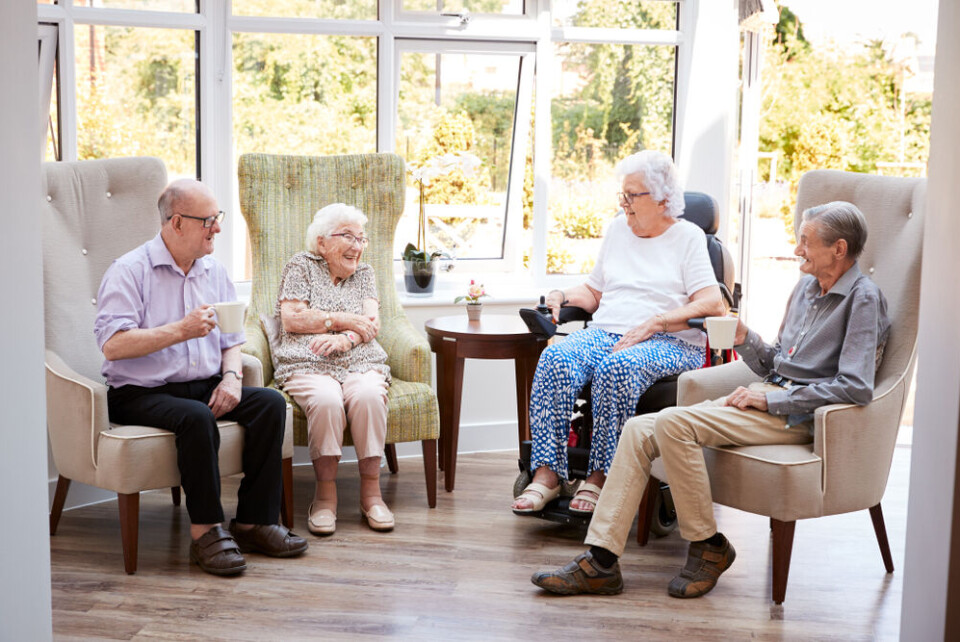-
Photos: Paris exhibition explores what people do alone at home
Behind the curtain: L’Intime Expo takes a fascinating look at people's private lives
-
Photo: what is the strange ‘hair ice’ phenomenon seen in France recently?
Extremely rare formation is occurring in eastern woodlands
-
Macron confirms what he wants to say to Trump when he visits US next week
Ukraine, EU and US relations and geopolitical situation are unsurprisingly key topics
French care home praised for giving residents replica of village life
Participation in simple activities like cooking or doing laundry helps residents to reduce their anxiety and normalises their sleeping routines

A municipal retirement home has won national praise for transforming into a replica village and giving residents key roles within the new structure.
Ehpad Kersalic, in Guingamp, Brittany, has a bar, a bistro, a grocery store, a dry cleaners and even a post office where a 91-year-old resident does the rounds each day to deliver mail.
The bar was made out of an odd-shaped corner which was previously unused, and has quickly gained regulars, both for the beer, wine and coffee it serves and for the games of belote.
Along with the physical changes, the establishment also changed the way it is run, so staff are more responsive to the 72 residents’ individual rhythms. If they wish to sleep late, for example, they can do.
Since the new village atmosphere was introduced, consumption of anti-depress-ants, sleeping pills and anti-anxiety pills has halved.
Guingamp mayor Philippe Le Goff told The Connexion: “It was not easy to make the transformation but it was a joint decision by the conseil municipal and the management to try to improve the Ehpad we had.”
Read more:How do retirement homes work in France?
Ehpad stands for établissement d’hébergement pour personnes âgées dépendantes, and is the name for all regulated retirement homes in France.
There is no distinction between nursing and non-nursing homes.
“We were noticing that more and more residents moving into the Ehpad, while needing care, were also capable of being independent and they found a more regulated home very difficult to adjust to.
“Now they find they can get involved doing things which they would have been doing up to the time they moved in with us – simple things like cooking or doing laundry and being active helps them.”
Starting five years ago, the changes have been introduced slowly, with management and the conseil municipal having to overcome resistance, including from some staff. This was brought about by training, including using drama courses.
Opposition also came from families of residents who did not understand the transformation and preferred their parents to retain a more regulated regime. They have since changed their minds.
Costs for residents in the home are around €2,000 a month, the same as before the changes, and it has a waiting list of 150 people looking to move in.
Mr Le Goff said the Kersalic home is unique in France and receives frequent delegations from councils wanting to see if it can be replicated elsewhere.
“Most leave scratching their heads but my advice to them is to do as we did – have a clear direction from the conseil municipal and the managers, and then take it step by step,” he said.
The Guingamp project is one of a number of local initiatives trying to challenge the negative perception of Ehpads in France.
Just before the election, a book called Les Fossoyeurs (The Gravediggers), by reporter Victor Castanet, highlighted bad treatment, poor food and unhygienic conditions in private Ehpads, supported by the government through generous grants and tax breaks.
Its publication caused a sensation.
Read more:French care home staffing levels are ‘nowhere near’ adequate
In Marseille, a crèche has opened in an Ehpad, with reports that interaction between generations is bringing joy to all.
In Lille, an Ehpad started taking residents to eat in a school canteen instead of in the home, again with positive results.
Related articles
Wages, pensions, ecology: over 100,000 protest on Labour Day in France
Why it is never too early to plan a secure retirement in France






















